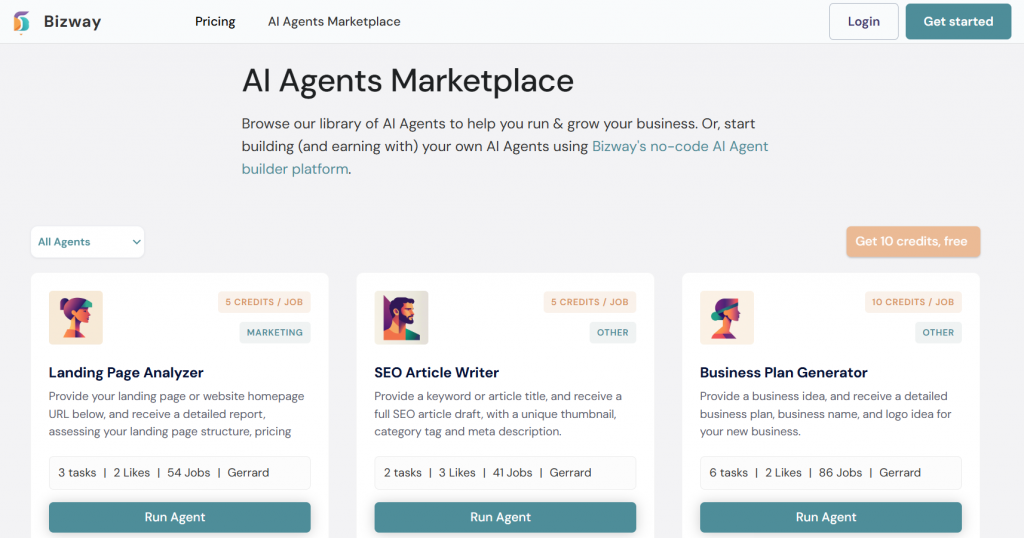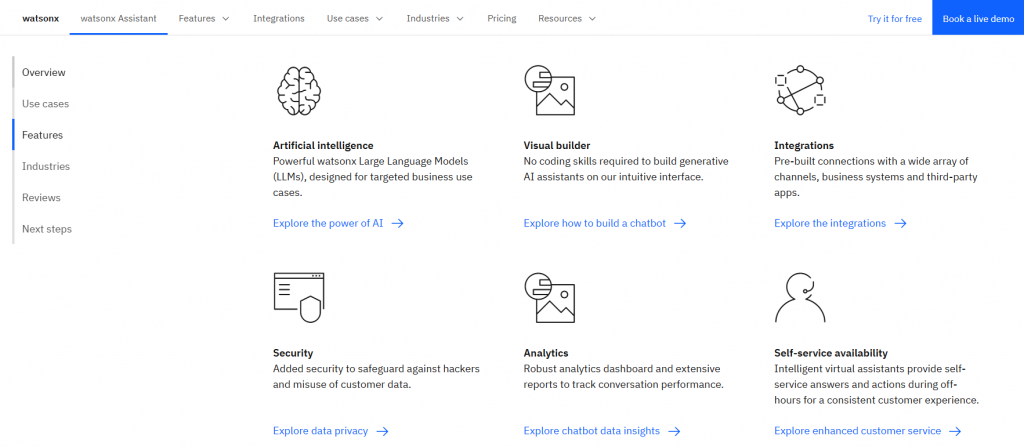AI agent software is like having a super-smart assistant that can understand tasks, make decisions, and get things done without needing constant help. These advanced programs use artificial intelligence (AI) to learn from data, respond to people, and handle tasks like scheduling, answering questions, or even analyzing complex information.
Imagine asking a virtual assistant to help you plan a trip. AI agents don’t just book flights; they can recommend hotels, adjust plans if something changes, and even remind you to pack based on weather predictions. They work across industries—helping doctors diagnose patients, businesses improve customer service, and students learn more efficiently.
AI agents are evolving fast, becoming smarter and more adaptable, making them essential tools for businesses and individuals.
Key Takeaways
- Several leading companies provide exceptional artificial intelligence (AI) solutions.
- Prominent names in the industry include Bizway, RelevanceAI, Lindy AI, Google Cloud AI, IBM Watson Assistant, Odin AI, UiPath, Cognigy, Kore.ai, and Relay.app. Each of these companies offers unique capabilities tailored to diverse needs.
- Their pricing models vary, with options such as pay-as-you-go, subscription plans, and enterprise licensing, allowing flexibility for different scales of businesses.
- Key advantages of adopting AI solutions include reduced manual labor, streamlined workflows, and faster problem resolution, making them invaluable for efficiency and innovation.
Best AI Agent Software in 2025
Bizway
What Does Bizway Do?
Bizway is an AI-driven business automation platform designed to help startups and growing businesses automate workflows, store business models, and monitor KPIs. It uses AI-powered assistants to optimize daily operations without requiring advanced coding skills.

Founder’s Information
Bizway was founded by a team of automation and AI enthusiasts focused on simplifying business workflows for non-technical users. The founding team’s details are available on Bizway’s official website.
Pricing
• Free Trial: Available
• Product Hunt Launch Discount: 50% off for the first three months
• Monthly Plans: Starting at $19/month
Main Features
• No-Code Interface: Easy for beginners
• KPI Tracking: Detailed insights into performance
• AI Automations: Streamlines repetitive tasks
• Business Model Storage: Keeps track of operational plans
Pros and Cons
| Pros | Cons |
|---|---|
| Easy-to-use no-code interface | Limited scalability for large enterprises |
| Affordable for small businesses | Advanced features may be insufficient for experts |
| Seamless integration with Google Analytics | Requires better training resources |
RelevanceAI
What Does RelevanceAI Do?
RelevanceAI provides highly customizable AI tools for developing advanced agents tailored to business-specific requirements. It specializes in enabling agent collaboration and seamless integrations with existing systems.
Founder’s Information
RelevanceAI was founded by Andrew Fong, a machine learning expert with over a decade of experience in AI systems. Learn more about the founder on LinkedIn.
Pricing
• Monthly Plans: Starting at $99/month
• Enterprise Options: Custom pricing based on usage
Main Features
• Agent Collaboration: Ensures smooth team integration
• Custom Integrations: Supports APIs for advanced connectivity
• Extensive Toolkit: For creating personalized solutions
Pros and Cons of RelevanceAI
| Pros | Cons |
|---|---|
| Advanced customization options | Setup can be complex for beginners |
| Strong technical support | Requires technical expertise to optimize use |
| Ideal for unique business needs | Pricing may be high for small businesses |
Lindy AI
What Does Lindy AI Do?
Lindy AI is a workflow automation platform that simplifies processes through integrations and enterprise-level security. Its intuitive interface makes it accessible for both technical and non-technical users.
Founder’s Information
Lindy AI was co-founded by a team of automation pioneers with experience in building large-scale systems. Discover their journey on Crunchbase.
Pricing
• Basic Plan: $49/month
• Professional Plan: $129/month
• Enterprise Plan: Custom pricing
Main Features
• Email Actions: Automates repetitive email tasks
• Integration Library: Connects with hundreds of apps
• Enterprise Security: Ensures data safety and compliance
Pros and Cons
| Pros | Cons |
|---|---|
| Scalable for businesses of all sizes | Can be overwhelming for beginners |
| Strong focus on security | Requires more onboarding documentation |
| Extensive integration options | May have a steep learning curve |
Google Cloud AI
What Does Google Cloud AI Do?
Google Cloud AI offers state-of-the-art AI solutions for businesses, including natural language processing (NLP), computer vision, and predictive analytics. It integrates seamlessly with the Google suite.
Founder’s Information
Google Cloud AI is developed by Google, led by Sundar Pichai, who has driven significant advancements in AI technology. Learn more on Google AI.
Pricing
• Pay-As-You-Go: Based on usage
• Monthly Plans: Custom pricing for enterprise solutions
Main Features
• Pre-Trained Models: Accelerates deployment
• Custom Training: Builds models tailored to business needs
• NLP and Computer Vision: For advanced data interpretation
Pros and Cons of Google Cloud AI
| Pros | Cons |
|---|---|
| Access to Google’s AI expertise | High costs for advanced features |
| Strong ecosystem integration | Learning curve for non-experts |
| Highly scalable solutions | Requires consistent internet connectivity |
IBM Watson Assistant
What Does IBM Watson Do?
IBM Watson Assistant provides AI-driven insights and solutions tailored for industries like healthcare, finance, and customer service. It excels in NLP and complex data analysis.

Founder’s Information
IBM Watson was created by IBM, led by visionary leaders like Arvind Krishna, CEO of IBM, with a focus on enterprise-grade AI solutions. Learn more on IBM Watson.
Pricing
• Basic Plan: Starting at $140/month
• Enterprise Plan: Custom pricing for large-scale deployments
Main Features
• Industry-Specific Solutions: Tailored for different sectors
• Workflow Automation: Optimizes processes
• Multi-Agent Collaboration: Enhances teamwork
Pros and Cons
Pros and Cons of IBM Watson
| Pros | Cons |
|---|---|
| Enterprise-grade reliability | Higher costs compared to competitors |
| Robust NLP capabilities | Setup may require technical expertise |
| Strong customer support | Steeper initial learning curve |
Relay.app
What Does Relay.app Do?
Relay.app focuses on contextual AI assistance by integrating real-time support with third-party apps for smooth automation. It simplifies workflows with intuitive features.
Founder’s Information
Relay.app was founded by industry leaders specializing in contextual AI. Discover more on Relay.app.
Pricing
• Basic Plan: Contact sales for pricing
• Advanced Features: Available at custom pricing
Main Features
• Real-Time Support: Immediate assistance for customers
• Third-Party Integrations: Compatible with popular apps
• Custom Automation: Adapts workflows to specific needs
Pros and Cons
| Pros | Cons |
|---|---|
| Immediate automated support | Lack of transparent pricing |
| Flexible integration capabilities | Requires technical expertise during setup |
| Strong customer engagement features | Limited advanced analytics tools |
Key Features of Top AI Agent Platforms
Natural Language Processing (NLP)
Natural Language Processing (NLP) is a key feature of AI agent platforms that enables them to understand, interpret, and respond to human language. This capability is foundational for applications like chatbots, virtual assistants, and customer service agents. NLP allows platforms to process text and speech in multiple languages, making them accessible to global audiences.
Advanced NLP algorithms can identify the intent and sentiment behind user inputs. For instance, a customer asking, “When will my order arrive?” triggers a specific response tied to tracking systems. Platforms like IBM Watson excel in NLP by integrating with business workflows, ensuring accurate and context-aware interactions.
By leveraging techniques like tokenization, sentiment analysis, and entity recognition, NLP ensures AI agents can manage complex conversations. This feature has revolutionized industries such as healthcare and e-commerce by providing precise, human-like interactions. Companies implementing NLP see increased user satisfaction and efficiency, making it a critical aspect of modern AI platforms.
Machine Learning Algorithms
Machine Learning (ML) is another cornerstone of AI agent platforms, enabling them to learn and improve over time. Through ML, these systems can identify patterns, make predictions, and adapt to changing environments. This capability supports tasks like product recommendations, fraud detection, and workflow optimization.
Platforms like Google Cloud AI offer advanced ML models trained on vast datasets to provide intelligent, data-driven insights. For example, in e-commerce, ML analyzes customer behavior to recommend products that align with user preferences. In healthcare, ML aids in diagnosing diseases by analyzing medical records and imaging data.
Machine learning encompasses supervised, unsupervised, and reinforcement learning. These techniques empower AI agents to process complex data and make decisions without constant human intervention. As more data is fed into the system, its predictions become increasingly accurate. Businesses adopting ML-enabled AI platforms benefit from smarter automation and deeper operational insights.
Data Integration and Management
Seamless data integration is critical for AI platforms to function effectively. This feature ensures the AI system can pull information from existing databases, APIs, and enterprise systems, creating a unified view of data. It eliminates silos, enabling better decision-making and more streamlined operations.
Platforms like Salesforce Einstein excel in data integration by connecting customer relationship management (CRM) systems, marketing tools, and analytics platforms. This connectivity ensures that AI agents access real-time data, enhancing their ability to perform tasks like generating reports or personalizing user experiences.
Effective data management includes organizing, cleaning, and analyzing large datasets. AI platforms employ techniques like data preprocessing and pipeline automation to ensure accuracy. By integrating data from multiple sources, businesses can achieve operational efficiencies, reduce redundancy, and make informed decisions faster.
Decision-Making Capabilities
AI agents’ ability to make decisions autonomously is powered by sophisticated algorithms that analyze data, weigh options, and recommend or execute actions. Decision-making capabilities are crucial for applications like autonomous vehicles, dynamic pricing, and supply chain optimization.
A prime example is DeepMind’s AlphaGo, which used decision-making algorithms to defeat world champions in the board game Go. This success demonstrated how AI can evaluate countless scenarios and choose optimal strategies.
AI decision-making relies on techniques like predictive analytics, neural networks, and reinforcement learning. These methods enable platforms to simulate outcomes, assess probabilities, and optimize results. Businesses leveraging this feature can react quickly to market changes, enhance customer experiences, and stay competitive in dynamic industries.
Conclusion
AI agent software is transforming how businesses operate by automating processes, enhancing decision-making, and delivering personalized experiences.
With advanced features like natural language processing, machine learning, and seamless data integration, these tools empower companies to achieve greater efficiency, reduce costs, and improve customer satisfaction.
Leading platforms like Google Cloud AI, IBM Watson, and RelevanceAI continue to push boundaries, offering tailored solutions for industries ranging from healthcare to e-commerce.
FAQs
What is AI agent software?
AI agent software is a type of computer program that uses artificial intelligence to perform tasks automatically.
What are the key features of top AI agent software?
Key features include automation, machine learning, natural language processing, and integration with other systems.
How much does AI agent software cost?
Pricing varies depending on the vendor, features, and usage – some offer free trials, while others charge a monthly or annual fee.



